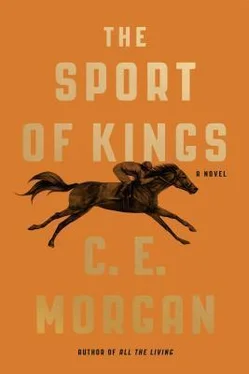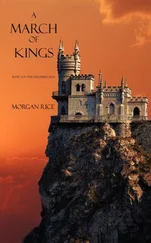When they cleared the last forty yards of the row, Penn called “Gee!” and the team made the lumbrous turn onto the next unriven row; they moved as the Greeks had written their language. But Penn pressed back with the full weight of his body, crying, “Whoa!” which Henry mirrored instinctively with a soft “Whoa,” and the whole rattling configuration came to a halt.
It was only now, with the leggy oxen resting idle in their harnesses, that Henry could take a proper look at them. They stood to his chest, their enormous white bulk — solid and stolid as if carved from marble yet radiating heat — brockled thick with black. Upon closer inspection, one ox’s black was more like midnight blue with white showing through like fat stars. Their long backs were plain with white but without the black that peppered their blockish heads. Their points too were black. They were animals of distinct stature, boasting a heavy, bulky dignity even as ropy mucus strings spooled from their nostrils and eager flies pestered them. Henry had never seen anything quite like them before.
“Randall Linebacks,” Penn said, approaching the blue and patting it where the yoke beam pressed into the heavy flesh of the neck. “America’s rarest breed. Colonial cattle. They came out of a closed herd up in Vermont. I got these two, because … I can’t work on tractors. And I can’t afford a tractor. Repairs are too expensive.”
As if in response, one ox lowed and stamped and rubbed with irritation against the curves of the oxbow.
Penn swiped at his sweaty face with his sleeve, but just smeared warrior lines of sweat and soil. He said, “They weren’t worth a damn when I got them here … Barely plow trained. This one especially, Boss”—he pointed to the steer with the blue buckling—“was just ornery. Every time I’d say gee, he went left. Every time I said haw, he’d go right … I could have got more done with a team of fainting goats.” He indicated with one hand. “That black one’s Taurus. She named them.”
Henry said nothing. He just listened.
Penn shoved his hands in his pockets and fixed Henry with an unblinking stare. “Thanks for calling me. I wouldn’t have known … Sometimes she just didn’t show up here for a long time.”
Henry nodded once.
Then Penn said, “I loved your daughter,” and the man’s forthright declaration startled Henry into looking into his broad face. Dappled spring sun was playing with shadow there like fleetings of emotion. The man said simply, “I really did.”
It seemed Henry could actually feel the spinning of the earth as he said, “And did she love you?”
“Eh, you know,” the man said with a dismissive shake of his weather-roughened hands, then, “Let me tie up these guys … I’ll show you a place she liked.”
With some effort he led the oxen to a line of old chestnut fencing that separated a fallow pasture from the clodded soil they had just turned. Using the plow lines, he secured the pair to the upper plank, which they sniffed and tongued with their ropy, inquisitive tongues, turning the wood dark with saliva.
Penn patted a sloping haunch and then they were off along the northern edge of the unturned field. At one point, without stopping, Penn grasped up a small rock from the soil and flung it out as far as he could into the field, the way a boy hurls a stone into a river to savor the violence in his own arms. He said, “I trusted Henrietta. She wasn’t always nice, you know? You can’t really trust anybody who wants to please you all the time— Hey, arrowhead.”
This time he stooped and grasped up a slate-gray chipped piece of flint, ancient and smooth-sided but still miraculously sharp. He handed it to Henry.
“Maybe she was kind of messed up. I don’t know. No offense. I went in the marines when I was still a kid, and I came out just … Most people probably aren’t worth much till they’re messed up. But I could be wrong about that.”
The pair passed a black, sagging tobacco barn, a sink like a meteor hole, and trees skirted by bushes. There came a rustling in the depths of one thicket, then a dog leaped onto the path, bounding toward them with his tongue a loll and his tail a banner over his back. Penn patted the dog and pointed up ahead of them where spindly trees clung to a rocky outcropping. “Your daughter liked this spot. Jack, stay. Stay.”
Henry stepped carefully onto the rock outcropping and stood very still, gazing straight ahead into the bliss or abyss, feeling his feet on the earth even as his forehead penetrated porous clouds. The green earth sprawled before him, but it seemed more like mockery than beauty. He felt dizzy and barely rooted as all of space went sheering past his body with a horrifying velocity, which he’d not understood before. He sensed it now because grief had rent the beautiful fabric of his former self. He could hear time whistling through the hollows of his bones. Grief had sucked out all the marrow.
Henry swayed precipitously, so Penn reached quickly for the point of his elbow, then placed one steadying arm around his shoulders. They stood side by side like father and son, one just approaching old age and one middle-aged, both staring into open space.
Penn cleared his throat. “But me,” he said, as though the conversation had not stopped. “I just like to stand here and think. Standing up high like this, I feel like I can … like up here, you can see everything. It’s the big view, you know. I feel lucky to have it. But what are you gonna do with a view like this? That’s the question.”
It felt like a dare, a challenge between men, regardless of how gently, how thoughtfully it was proffered. Henry shrugged off Penn’s protective arm and stepped out to where the rock and soil crumbled away and looked down over the careening edge. He looked and looked and looked. But in the interstices of the rock formations, in the distant canopy of the trees, in the land, he saw nothing, not even history. The entire natural world was composed of dirt and its senseless inhabitants. His frustration mounted to agony.
He whirled around, his face stricken, and he cried, “What did my daughter think of?”
Instinctively, Penn grasped Henry’s forearms and pulled him in toward him, asking sharply, “What? Here?”
“Yes!”
If Penn found the question odd, he didn’t show it. He continued to grasp Henry’s forearms as he considered this very seriously. Then his face brightened with remembrance and he said, “She thought of you. I remember now. She thought of your family name.”
* * *
The fevers came and with them the dreams, so once the stars began their sardonic winking, he was rolling in her arms once more, his hips cracking against her coffin box, the lily-white baby hard as a bomb between them, then she was crying his name, which his dead mother had given him, or it was the sliver moon catcalling through the prison bars, and he was moaning himself awake in the jittery space between fever and wakefulness, thoroughly confused and baptized in sweat. He lay with dry eyes pressed to the crook of his arm, riding the tides of Hell’s night breathing, the sound of her entrapment, his own: Get me out of this nightmare.
But there was something on the scent of harvested hay this early morning, a sharp, strange tune adrift on the barely moving air. He knew the source before his eyes could discover it in the dark — the little jock perched on a farrier’s stool, an unlit cigar tilting jaunty from his lips, his hands patting a rhythm on his thigh.
“Reuben,” Allmon said confusedly, the dream of alarm still in his mouth. He sensed the great shadow of Hell’s head as it swung, curious, over the door.
“Fret not,” said the jock, crossing his wiry legs. “I was just a-wandering through on my way to Hialeah, thought I’d say hello to the Barbary horse and the Cincinnati Kid — and here I find you just a-moaning and a-crying in your sleep, a right sorry sight to be sure.” Reuben scooted his stool closer, his eyes shining in the moonlight. “What ails you, my little nut? There’s a rattle in your chest and a tear in your eye.”
Читать дальше
Конец ознакомительного отрывка
Купить книгу












